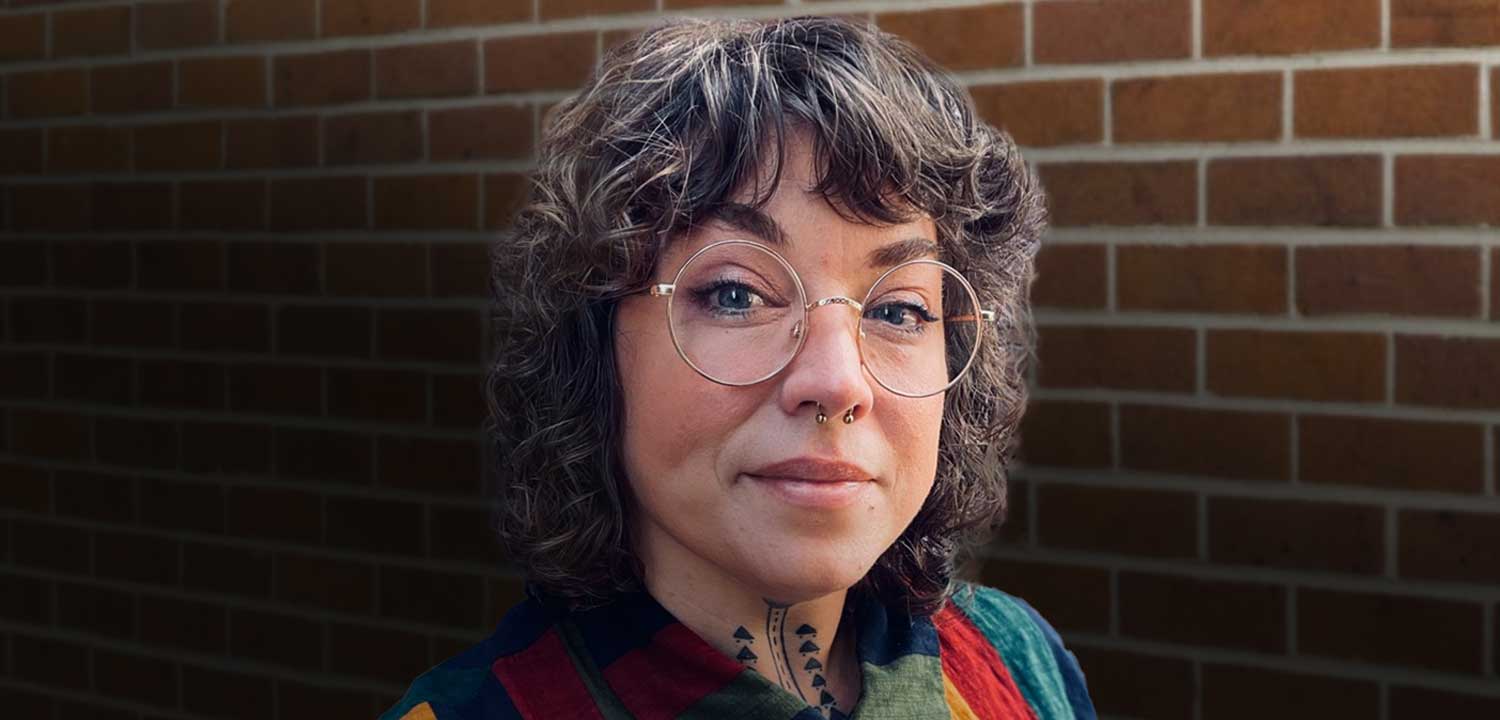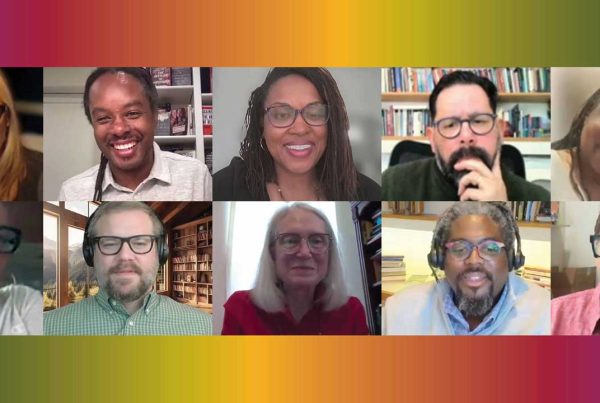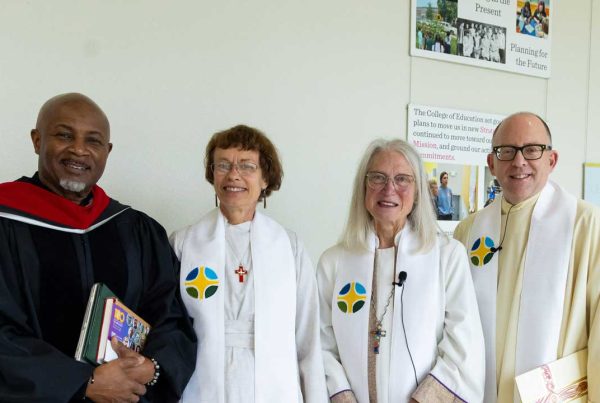Student Spotlight: Tyne Parlett
Tyne Parlett is the kind of person you feel immediately comfortable around. They have a vibrant and yet calm demeanor, the sort of vibe that both wakes you up with energy and puts you instantly at ease. I met Tyne in a coffee shop recently for an interview, and the conversation flowed with a natural cadence I could not have planned. It only takes a few minutes to experience how present and embodied Tyne is – a true gift that draws others to be fully present as well.
Tyne is in their second year as a student at Christian Theological Seminary pursuing both Master of Divinity and Master of Arts in Clinical Mental Health Counseling degrees. They just started their first semester of supervised ministry, stepping into a role at St. Paul’s Episcopal Church in Indianapolis where they will be building out a lay chaplaincy program that focuses on death and dying. As an experienced death doula, Tyne is able to bring expertise and draw upon community partnerships, including a partnership with Morning Light hospice care and the Abbie Hunt Bryce home to provide hospice care for people who cannot otherwise afford dying in a home-based setting. “My goal is teaching people the soft skills it takes to sit with someone as they go through the process of death. I’m able to use my skills to help the congregation and the larger community,” Parlett shares. The program will be open to community members as a highly relational volunteer opportunity to sit with others as they face end of life transitions.
In undergraduate studies, Tyne majored in Philosophy and minored in Religious Studies. They do not identify as Christian, but certainly identify as a deeply spiritual human. During protests following the death of George Floyd and other persons of color due to police violence in 2020, Tyne met Rev. Patrick Burke, a former CTS student and ordained Reverend in the Episcopal Church who served in Indianapolis. The two soon found they were kindred spirits, not only in their values, but also in how they showed up at protests and demonstrations to hold space for marginalized and persecuted fellow humans. The more Tyne got to know Patrick, the more they learned about CTS and felt it could be the next right step in their education and development.
I asked Tyne how they came to pursue graduate degrees at a theological seminary. “When I left the nonprofit sector, I felt I needed the kind of degrees that could generate believability and creditability for trans people in religious leadership and counseling. The pairing of being a theologian and a healer made a lot of sense in my work; it neutralizes the way trans people are often politicized. As a person not from a Christian faith tradition who is deeply spiritual, I didn’t want to feel that was detrimental to my pursuit of training in theology and counseling,” Tyne said in response.
They applied to both Chicago Theological Seminary and Christian Theological Seminary, were accepted to both, and were awarded scholarships by both. The choice was theirs to decide which theological seminary was the right fit. After a first visit to CTS where Tyne met Dr. Nicole Robertson (Director of the MACMHC degree program), they said the decision was easy.
“Dr. Robertson’s transparency, kindness, and accessibility were reflective of how I want to be present in learning and in the classroom. She embodied bell hooks’ concept of democratic learning, something that is very important to me. My decision was made after that first interview. CTS was the right choice. All of us in my cohort are reconciling the same harms and existential conflicts together. I feel both accepted for who I am and challenged to grow here,” Tyne says, adding, “My main concern was that Chicago Theological Seminary seemed more progressive to me – it seemed more mature and structured in its justice programs. However, CTS is in Indianapolis, the community I call home. This is where I’ve chosen to live and love and fight for a long time. At CTS I can join in the justice work and help shape it.”
Tyne says the feeling of being accepted and challenged at CTS has only continued. “As a person who doesn’t have a home church to go back to and be nurtured by, Dr. Rob Saler stepped in and challenged me on my preconceived notions. He helped me grapple with the things I don’t understand – he makes so much room for that and for processing difficult theological concepts, even those I find problematic. Not every student needs the same challenge. I find my professors pay attention to how each student needs to be challenged. Each of us needs to be forced out of the idea that we have the answers to everything. As students, we find a connection in this despite our differences. Many of us didn’t seem to have much in common initially, but we get to know each other intimately as we navigate deep academic waters together. We all have been misunderstood in our lives. That’s a silent handshake we all have.”
The CTS connection continues for Tyne in their student ministry role at St. Paul’s, where Rev. Jeff Bower (another CTS alum) is their supervisor. Rev. Bower is an openly gay and married priest in the Episcopal Church, a queer connection that Tyne appreciates as they process their own intersectional identity. Tyne shares, “I am a queer, non-binary, trans student with disabilities. My own intersections help me better understand that all people have intersections of identity. My husband August is also a queer person, and my daughter Zoe works at a Montessori school with K-3rd grade kids who have autism spectrum disorder.” Recognizing that people are most empowered when they can bring their full intersectional identities and truest selves into embodiment, Tyne sees their own embodiment as an important part of their work in theology and counseling. As they cooly sip their latte, they drop another profound assessment of how those two fields are not mutually exclusive, but rather inextricably linked to human healing and wholeness. “I think human behavior is neutral. It tells a lot about what is going on within a person. In my mind, people need faith and they need a therapist. CTS is in a unique position with the School of Counseling and the School of Theology. Those two things are often stigmatized and not allowed to live in the same body. People aren’t often given permission to hold the tension of believing they are both holy and that they can move towards wellness in the same space. CTS demands that people engage that concept. CTS helps you move into a more actualized person – a more holistic version of yourself.”
The conversation takes what at first seems like a turn as Tyne shares about their family pets – three dogs and a King snake named Moto. However, within moments it is clear this is not an aside but rather a continuation of the conversation’s theme of embodied presence. Upon hearing I have a fear of snakes, Tyne smiles and kindly offers some reassurance. “I was a bit afraid I would be a bad snake owner, but it turns out that after watching and learning snake behavior, I went from simply respecting Moto to having a sweet relationship with her. She’s very much like people I know: she reacts to her environment, and you have to create conditions for her to trust you. Snakes demand that you pay attention when you are around them; you have to be present in your body around snakes. You need to be fully embodied.”
I find this quote is a microcosmic reflection of who Tyne is and how their own willingness to be present in their body gives others permission to do the same, building the right conditions for people to trust. Tyne is willing to address false dichotomies that many of us struggle to hold in tension in our lives. In a world of cultural binaries, they are comfortable helping people navigate transitions (what they refer to as gray spaces). Tyne shares, “Before death there is an obvious gray space where people are both in and out of life, but the same is true of gray spaces where people are both in and out of careers, of faith, of relationships, or of identities. How do I, with my intersectional identity, show people that there is a necessary pause we need in our transitions? That instead of focusing on the destination, the in between spaces are where we need to be present? I truly believe that if we radically accepted the tension within dichotomies we experience rather than wishing them away, the world would radically change.” They hope their studies at CTS will equip them to help others cradle the cusps of life, embracing transitions without expectation rather than trying to move out of the gray spaces before gleaning wisdom and beauty from them.






